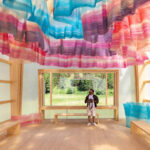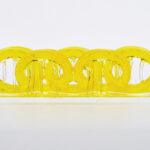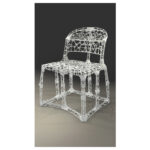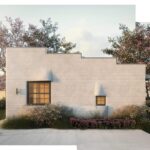Studio RAP, a Dutch architecture firm, recently completed a facade for an Amsterdam boutique using 3D printed ceramic tiles. The company is also notable for cladding a housing development with thousands of 3D printed blue titles, as we previously covered here.
This latest design, located on P.C. Hooftstraat, is inspired by the traditional knitwear silhouette and the rich heritage of ceramic art in Amsterdam. The project, conceptualized for Warenar real estate, stands out for integrating textile-like details into ceramic materials.

Each tile is uniquely crafted to reflect knitwear intricacies, such as stitch patterns and yarn interlooping. Studio RAP co-founder Lucas ter Hall emphasized the fusion of historical ceramic significance with modern fashion identity in the facade. The tripartite structure maintains visual continuity with neighboring buildings, facilitated by 3D-scanning for precise alignment.
The facade features pearlescent white tiles at ground level, glazed by Royal Tichelaar, and red-hued 3D printed “bricks” on upper levels, mounted on laser-cut steel cassettes. This collaboration highlights a blend of traditional glazing techniques with contemporary additive manufacturing.

The facade’s design changes with the viewer’s perspective, revealing intricate details upon closer inspection while harmonizing with the street’s historical context from afar.

This project, along with Studio RAP’s previous works, signals a shift in architectural practices, integrating computational design and digital fabrication to create dynamic, multi-layered structures.This blend of old and new methods could lead to more dynamic, responsive building designs, with a focus on detail, texture, and historical context.
Source: dezeen.com
Come and let us know your thoughts on our Facebook, X, and LinkedIn pages, and don’t forget to sign up for our weekly additive manufacturing newsletter to get all the latest stories delivered right to your inbox.










